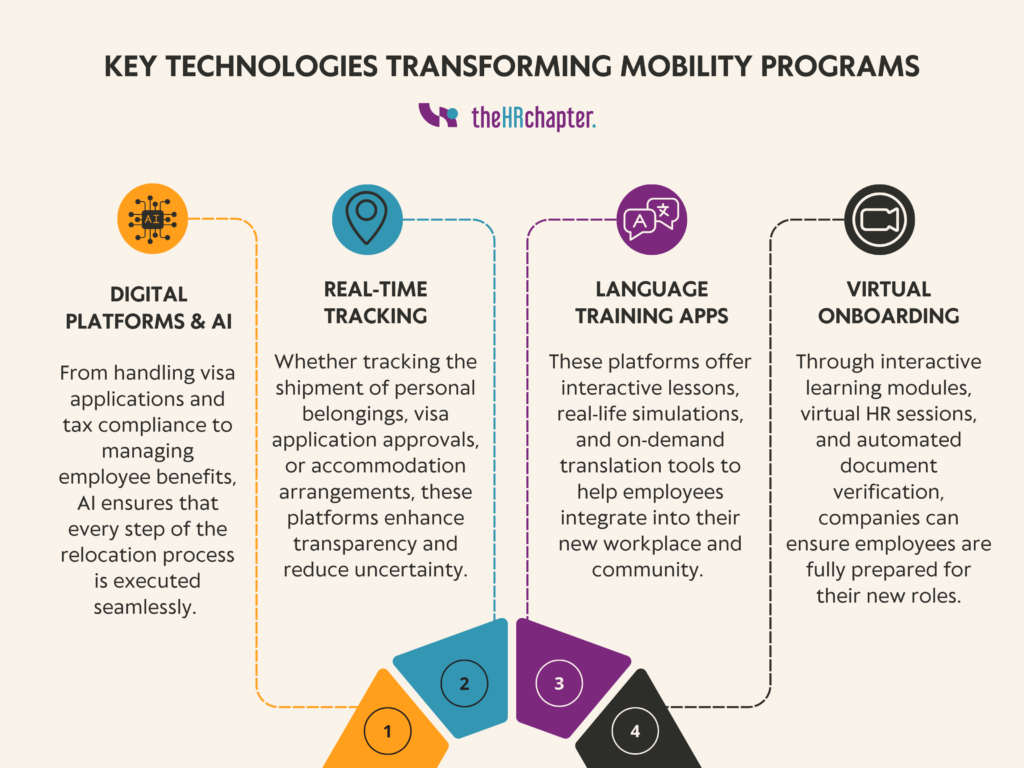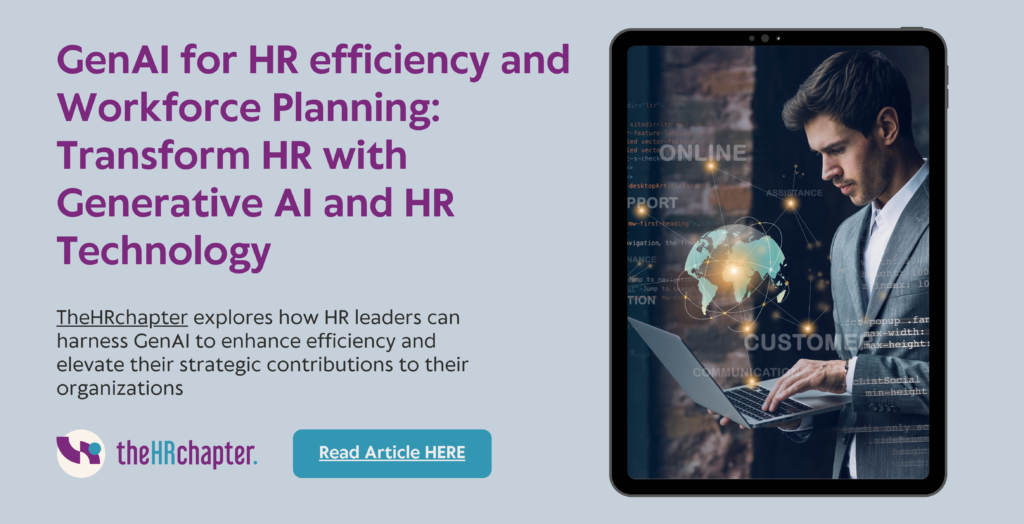The Future of Global Mobility: How technology is reshaping employee relocation

Global mobility has become a crucial aspect of modern business, with companies increasingly expanding their operations across borders. According to a 2023 Mercer survey, 57% of multinational organizations reported an increase in employee relocations, highlighting the growing demand for seamless and efficient mobility programs. However, traditional relocation processes come with significant challenges, including logistical complexities, compliance with international regulations, cultural adaptation, and employee dissatisfaction. A study by EY found that 40% of expatriates face difficulties adjusting to their new environment, impacting both productivity and retention rates.
In this article, TheHRchapter explores how businesses are adopting technology-driven solutions to overcome relocation challenges, enhance efficiency, and elevate the employee experience. Advanced digital platforms now provide real-time tracking, virtual onboarding, AI-driven assistance, and cultural training tools, ensuring a seamless transition for relocating employees. By integrating these innovations, companies can streamline operations, reduce administrative burdens, and significantly improve employee satisfaction and engagement.
The need for technology in global mobility
Traditional relocation processes come with significant challenges, including logistical complexities, compliance issues, and cultural adaptation difficulties, often leading to inefficiencies and employee dissatisfaction. To address these topics, companies are increasingly embracing technology-powered solutions that streamline mobility programs and enhance the overall employee experience.
Technology is transforming the relocation industry by replacing outdated, paper-driven processes with AI and automation, improving efficiency and regulatory compliance. Advanced digital tools now allow companies to track key performance indicators such as relocation costs and timelines, enabling data-driven decision-making. Additionally, automation in areas like document management and expense tracking simplifies the relocation process for both HR teams and employees, ensuring a smoother and more seamless transition.
Key technologies transforming mobility programs
As companies strive to enhance the efficiency of global mobility programs, technology is playing a pivotal role in streamlining processes and improving the overall relocation experience. From automation to real-time tracking, these innovations are reshaping how organizations manage employee transitions.

Benefits of technology integration
Bringing technology into global mobility programs has big upsides for companies and employees who are moving. Using automation, AI, and data-based answers helps businesses make relocation smoother, cut expenses, and improve the whole process. Here’s a look at the main perks of adding technology to mobility programs.

Technology enhances efficiency, employee satisfaction, and cost-effectiveness in global mobility programs. Automation and AI-driven tools streamline administrative tasks like visa processing, expense tracking, and compliance management, reducing processing times and easing HR workloads. Cloud platforms also enable collaboration with ease, providing smooth transition.
For workers, technology enables tailored support through AI helpers, virtual onboarding, and cultural adaptation apps, making it simple for them to settle into new environments. In addition, predictive analytics and software for digital expense management simplify relocation plans, reducing errors and costs. Organizations that embrace these technologies will create more efficient, employee-focused, and cost-effective mobility programs, making them stand out in a competitive global economy.
The future is digital: trends in mobility technology
As technology continues to evolve, global mobility programs are becoming more sophisticated, efficient, and employee-friendly. The future of mobility will be driven by innovations that enhance automation, security, and data-driven decision-making. Here are some of the most promising trends shaping the future of relocation technology.
a. Predictive analytics for optimizing global assignments. Predictive analytics uses AI and big data to help companies make informed relocation decisions by analyzing historical trends and real-time insights. It can forecast cost fluctuations, visa delays, and retention risks, allowing HR teams to strategically plan assignments. Additionally, predictive models assess employee suitability for international roles based on job performance and adaptability, ensuring cost-effective and successful relocations.
b. AI-Driven relocation assistants. AI is revolutionizing global mobility by providing intelligent relocation assistants that offer personalized support, real-time guidance, and task automation. These AI-powered tools help employees with local regulations, housing, and cultural adaptation, while automating visa applications, expense tracking, and document management to ease HR workloads. As AI evolves, these assistants will become more intuitive, offering proactive recommendations and predictive insights to enhance the relocation experience.
c. Blockchain for secure document management. Blockchain is transforming relocation document management by providing tamper-proof, decentralized storage for work permits, tax forms, and contracts. This technology enhances security, transparency, and compliance, reducing risks like fraud and data breaches. Additionally, blockchain simplifies cross-border transactions, streamlining payroll, contracts, and financial management, making global mobility more efficient and secure.
Technology is causing a revolution in global mobility, which has an impact on employee relocation to make it more productive, safe, and worker-friendly. AI helpers, blockchain for safe document handling, and data forecasting are changing how companies handle moves. This cuts down on paperwork and makes people happier overall.
To stay ahead, companies need to put money into digital mobility tools that boost productivity, cut costs, and make moving smooth. TheHRchapter is ready to help organizations use new tech to change mobility programs. Get in touch with us now to simplify your moving processes and improve the worker experience.
Need help with other HR services for your business?
At TheHRchapter, we provide tailored solutions to guide startups and scaleups in choosing and implementing the best tools for hiring, onboarding, payroll, employee management and more.
Core HR Services
- HR Consulting: Provides expert advice on various HR matters, including policies, procedures, and compliance
- HR Services for Startups: Offers tailored solutions for startups, helping them establish a strong HR foundation.
- Payroll Services: Manages payroll processing, tax filings, and employee benefits.
Let us help you streamline your HR processes and achieve your business goals. Contact us today to get started!
Spread the Word!
Enjoyed what you’ve read? Help others discover it too! 📢 Share this article and let’s keep the discussion going.
Related Reads: Check out these other Articles!
Expanding to Europe? Why Hiring Is Where Scale Usually Breaks (and How to Fix It Early)
Expanding to Europe? Why Hiring Is Where Scale Usually Breaks (and How to Fix It…
Agentic AI and HR Ethics: Best practices and ensuring compliance for employees and candidates
Agentic AI and HR Ethics: Best practices and ensuring compliance for employees and candidates There’s…
2025: The Year HR Became Strategic – Key Lessons and Insights for HR Leaders
2025: The Year HR Became Strategic – Key Lessons and Insights for HR Leaders 2025…




